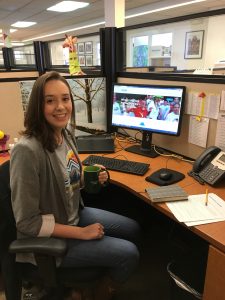Four years ago I stood on the third floor of Rowe, unsure of what I wanted to dedicate the next three years to learning about. I’d spent my first year at UConn exploring disciplines—and just when I’d hoped it would clarify my choices, it did the opposite. Instead, I was intrigued by the different lenses sociology, psychology, English literature, human development, and anthropology applied to the same subjects. How did family systems theory, Faulkner’s and Morrison’s fictional characters, and social determinants of well-being overlap? How did they differ? With these questions in mind I set out to study Cultural Influence on Youth Development.
My individualized major focused on the ways cultural narratives, circumstance, and media shape human development. I left UConn understanding the power of narrative – its ability to affect everything from which sneaker we buy to what we remember most easily, and, of course, our values and worldview. Stories, language, and people, and their intersection, were at the heart of it. Now, as a young professional in digital marketing, these three remain at the core of my work.
Through the Newman’s Own Foundation Fellowship I landed at SeriousFun Children’s Network, a global community of 30 camps and programs serving children living with serious illnesses and their families free of charge. At the Network support center, I manage social media channels and develop content. In short, I craft and tell stories about the life-changing work done at camp. A few years ago, I’d never imagined that content marketing, not seemingly like English literature, would be rooted in meaningful storytelling and relationship building, but by image and post rather than character and chapter. I’ve come to appreciate the layers of psychology and strategy that go into creating effective digital communications.

My time at SeriousFun continues to deepen my understanding of youth development as well. From my experience as a volunteer at SeriousFun camps in Michigan, North Carolina, and Connecticut, such as The Hole in The Wall Gang Camp, I can tell you that camp really is life-changing. The effects of health challenges on kids and their families can be serious and far-reaching. Fear, stigma, and isolation strain identity, work-life balance, relationships with others, and family dynamics, taking a toll on overall health. Under such trying circumstances, camp serves as a haven. In its fully-accessible and all-inclusive glory, it is a place to reclaim joy, restore confidence, renew hope, and rediscover possibility. Shared laughter and free play is some powerful stuff!
When I designed my major, I didn’t know where it would take me or just how much my daily work would relate! Now two years out of school, I’m still not sure what the future will hold. But I’ve realized that’s par for the course. Thankfully, I am more confident about a few things. And that’s just how important looking between disciplines, reaching across silos, and staying curious can be. I’m grateful everyday for the interdisciplinary perspectives I gained through my major. I think there are few things as applicable as those perspectives—no matter your profession—in today’s world.
By Sarah Luft
IMJR: Cultural Influence on Youth Development